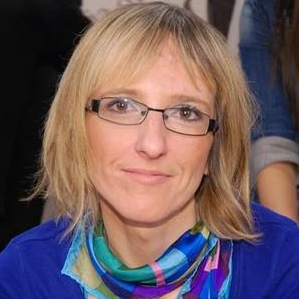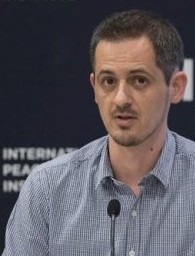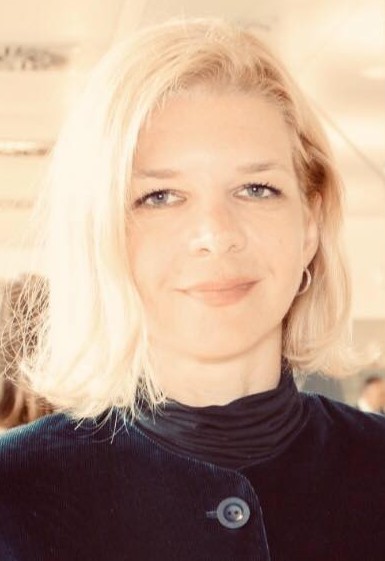 Dr. Nejra Nuna Čengić is an anthropologist who completed her PhD in Slovenia. Her doctoral thesis dealt with relationship between war violence and speech exploring narrative strategies that citizens of Sarajevo employ in their war accounts and meanings they ascribe to their war experience. The dissertation was published as a book in 2017, under the title ‘Desilo se to što se desilo’. Govor, život i vrijeme u Sarajevu nakon opsade’ ('Desilo se to što se desilo’: Speech, Life and Time after the Siege of Sarajevo), Orion Art, Belgrade. Her current research investigates the influence of international intervention in BiH on labour transformation; in particular investigating how short-term project based engagements affects life plans, sense of future, social reproduction. She is the author of a series of single-authored and co-authored articles, book chapters and books published locally and internationally. From 2007/2008 onwards she has taught the postgraduate course Life Stories and Dialogues at the Centre for Interdisciplinary Studies at the University of Sarajevo, where she also gained most of her professional experience. She made significant contribution to establishment of the Gender Studies Programme at the University of Sarajevo. She is a member of a number of professional and activist networks. Currently, she is a Post-doctoral Research Fellow at the University of Manchester, Department for Social Anthropology. She (mostly) lives and works in Sarajevo, BiH.
Dr. Nejra Nuna Čengić is an anthropologist who completed her PhD in Slovenia. Her doctoral thesis dealt with relationship between war violence and speech exploring narrative strategies that citizens of Sarajevo employ in their war accounts and meanings they ascribe to their war experience. The dissertation was published as a book in 2017, under the title ‘Desilo se to što se desilo’. Govor, život i vrijeme u Sarajevu nakon opsade’ ('Desilo se to što se desilo’: Speech, Life and Time after the Siege of Sarajevo), Orion Art, Belgrade. Her current research investigates the influence of international intervention in BiH on labour transformation; in particular investigating how short-term project based engagements affects life plans, sense of future, social reproduction. She is the author of a series of single-authored and co-authored articles, book chapters and books published locally and internationally. From 2007/2008 onwards she has taught the postgraduate course Life Stories and Dialogues at the Centre for Interdisciplinary Studies at the University of Sarajevo, where she also gained most of her professional experience. She made significant contribution to establishment of the Gender Studies Programme at the University of Sarajevo. She is a member of a number of professional and activist networks. Currently, she is a Post-doctoral Research Fellow at the University of Manchester, Department for Social Anthropology. She (mostly) lives and works in Sarajevo, BiH.
 Dr. Zlatiborka Popov Momčinović is an associate professor of political sciences at the Faculty of Philosophy, University of East Sarajevo. Her PhD dissertation was Women's Movement in post-Dayton Bosnia and Herzegovina: Achievements, Initiatives, and Controversies at the Faculty of Political Sciences in Belgrade. The focus of her research is on gender, development of civil society and women’s activism, religion and politics, professionalism of media and reconciliation processes. She is active in civil society, trying to reconcile scientific and activist engagement, and was engaged as an expert and key-note speakers by various NGOs in activities related to gender equality, religious tolerance and dialogue, rights and freedoms of marginal groups (autistic children, mothers of children with disabilities, LGBT population), media literacy, political culture and participation.
Dr. Zlatiborka Popov Momčinović is an associate professor of political sciences at the Faculty of Philosophy, University of East Sarajevo. Her PhD dissertation was Women's Movement in post-Dayton Bosnia and Herzegovina: Achievements, Initiatives, and Controversies at the Faculty of Political Sciences in Belgrade. The focus of her research is on gender, development of civil society and women’s activism, religion and politics, professionalism of media and reconciliation processes. She is active in civil society, trying to reconcile scientific and activist engagement, and was engaged as an expert and key-note speakers by various NGOs in activities related to gender equality, religious tolerance and dialogue, rights and freedoms of marginal groups (autistic children, mothers of children with disabilities, LGBT population), media literacy, political culture and participation.
 Dr. Randall Puljek-Shank is a peacebuilding practitioner and political scientist based in Sarajevo. At the PeaceNexus Foundation he guides the organizational development of PeaceNexus partners and encourages inclusive dialogue with businesses. His consulting practice has focused on the design of educational progams and their evaluation. His research interests focus on the intersection of civil society and the politics of ethnically divided societies and he has published in the journals Cooperation and Conflict, Democratization, Voluntas and East European Politics and Societies: and Cultures. The implications of his research for donor policies were analyzed in the policy brief Beyond Projects: Legitimacy and Civil Society Advocacy in Bosnia and Herzegovina.
Dr. Randall Puljek-Shank is a peacebuilding practitioner and political scientist based in Sarajevo. At the PeaceNexus Foundation he guides the organizational development of PeaceNexus partners and encourages inclusive dialogue with businesses. His consulting practice has focused on the design of educational progams and their evaluation. His research interests focus on the intersection of civil society and the politics of ethnically divided societies and he has published in the journals Cooperation and Conflict, Democratization, Voluntas and East European Politics and Societies: and Cultures. The implications of his research for donor policies were analyzed in the policy brief Beyond Projects: Legitimacy and Civil Society Advocacy in Bosnia and Herzegovina.

Dr. Jasmin Ramović is a Lecturer in Peace and Conflict Studies in Politics Department at the University of Manchester. He is interested in interdisciplinary approaches to studying international relations, particularly the intersection of anthropology, international political economy and peace and conflict studies. His research focuses on local actors in conflict-affected settings, with a specific focus on the economic dimension of their everyday. This has led his recent research projects to concentrate on examining the potential of the workplace for peacebuilding in Bosnia and Herzegovina, particularly the changes which affected this space in country’s transition from the socialist to capitalist economy. He is also interested in analysing the state of social contracts in societies divided by violent conflicts. His research has been published in international journals and he has recently co-edited The Palgrave Handbook of Disciplinary and Regional Approaches to Peace (2016).

Dr. Oliver Richmond is a research professor in Politics Department, University of Manchester. His primary area of expertise is in peace and conflict theory, and in particular its inter-linkages with IR theory. He is currently working on a book on The International Peace Architecture and Global Order in the 21st Century (OUP, forthcoming). His most recent work has been on peace formation and its relation to state formation, statebuilding, and peacebuilding (Failed Statebuilding and Peace Formation, Yale University Press 2014 & Peace Formation and Political Order, Oxford University Press, 2016). This area of interest has grown out of his work on local forms of critical agency and resistance, and their role in constructing hybrid or post-liberal forms of peace and states (see A Post-Liberal Peace, Routledge, 2011), as well as earlier conflict resolution and conflict management debates in IR, including international mediation, peacekeeping, and state formation debates. He has also published a Very Short Introduction to Peace (Oxford University Press, 2014), which offers an overview of the development of related concepts, theory and practices. He edits a Palgrave Book Series called Rethinking Peace and Conflict Studies, which seeks to provide a forum for the development of new and alternative approaches for understanding the dynamics of conflict and of the construction of peace. He is also co-editor of the journal "Peacebuilding”.
 Dr. Valida Repovac Nikšić is an Associate Professor at the Faculty of Political Science, University of Sarajevo. Previously, she worked in the Directorate for European Integration, Council of Ministers of Bosnia and Herzegovina. In 2014, Valida obtained a PhD in Sociology at the Faculty of Political Science, University of Sarajevo. Her work focuses on cosmopolitanism, multiculturalism, nationalism, discrimination, new racism and populism. She is an Editor in Chief of Sarajevo Social Science Review.
Dr. Valida Repovac Nikšić is an Associate Professor at the Faculty of Political Science, University of Sarajevo. Previously, she worked in the Directorate for European Integration, Council of Ministers of Bosnia and Herzegovina. In 2014, Valida obtained a PhD in Sociology at the Faculty of Political Science, University of Sarajevo. Her work focuses on cosmopolitanism, multiculturalism, nationalism, discrimination, new racism and populism. She is an Editor in Chief of Sarajevo Social Science Review.

